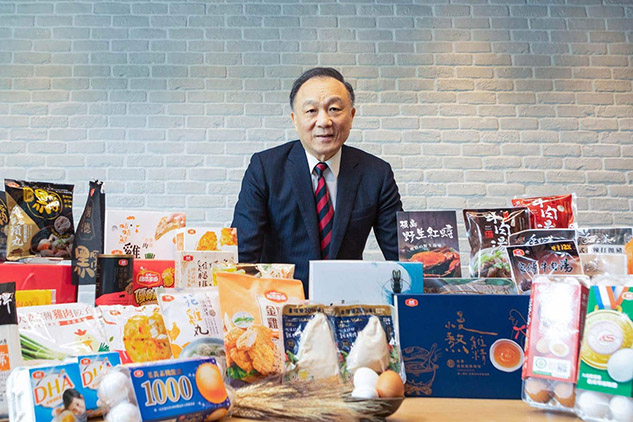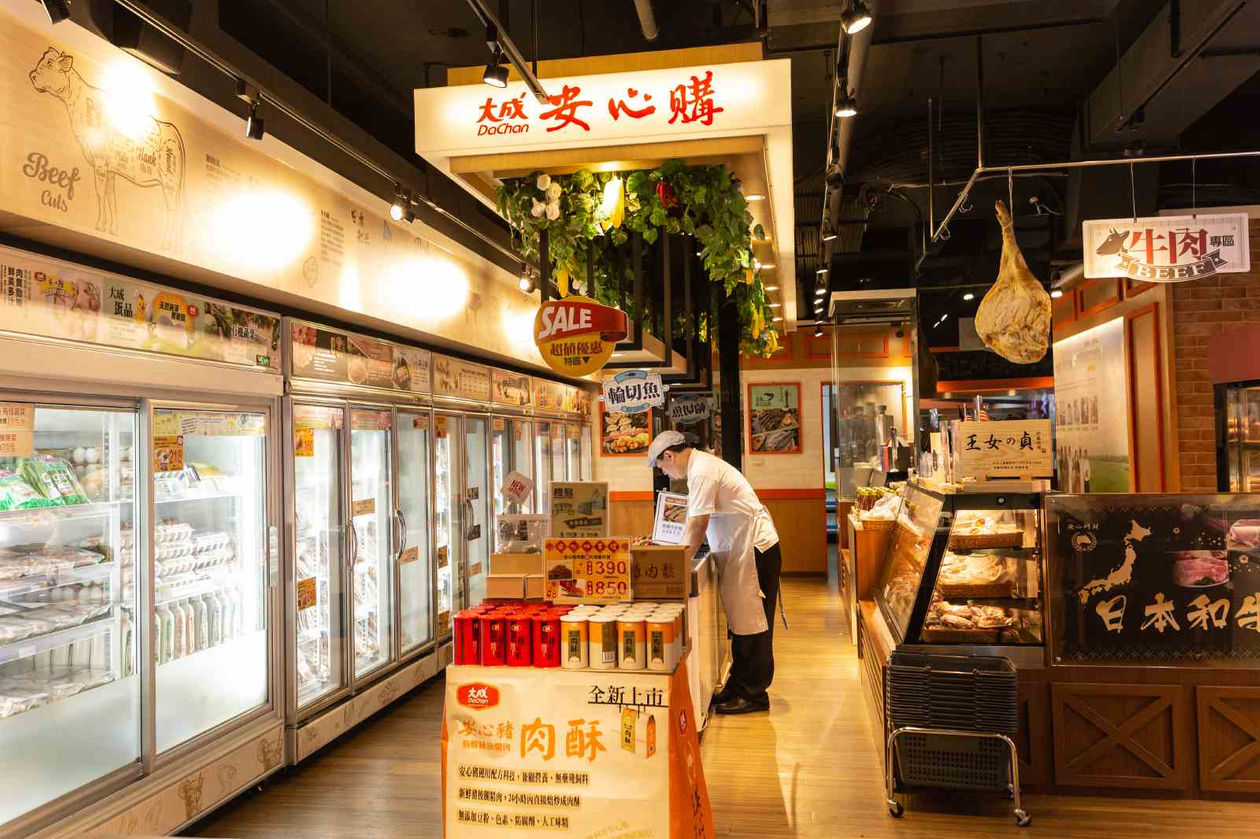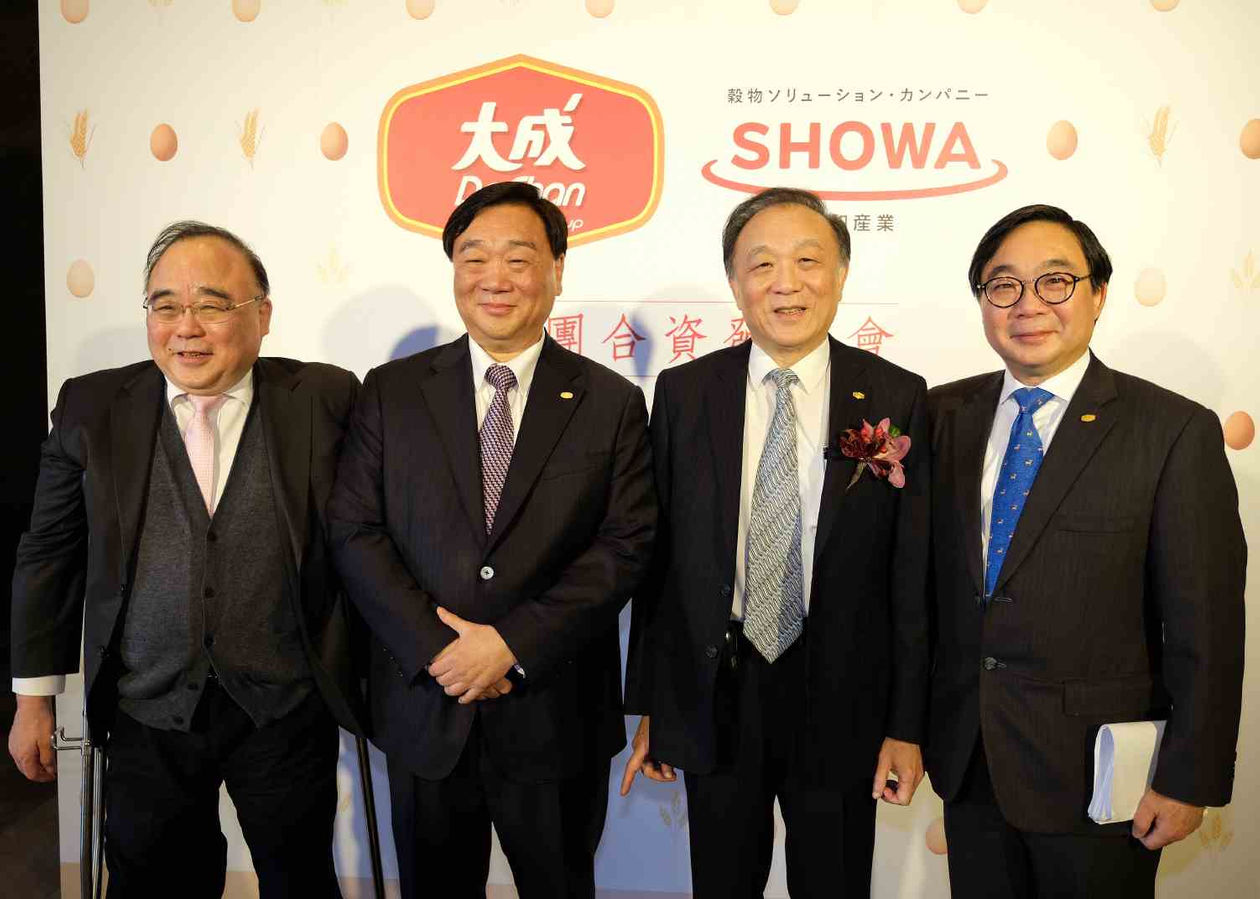Fewer Production Lines for Higher Profits
From Small Oil Mill to Asian Food Conglomerate

Source:Zhouqi Wu
From eggs to cookies, from feed to vaccines, from livestock to schnitzel - the business of Taiwan’s DaChan Great Wall Business Group spans the entire supply chain from producing livestock to processing foods and bringing them to restaurants and dinner tables. What started out as a small processor of soybean oils in Tainan 64 years ago has grown into a food conglomerate with more than 100 subsidiaries in Taiwan, China and Southeast Asia. What is the secret behind their success?
Views
From Small Oil Mill to Asian Food Conglomerate
By Meng-hsuan YangFrom CommonWealth Magazine (vol. 701 )
One out of three broiler chickens in Taiwanese poultry farms is raised with DaChan feed. And with a seven percent market share, the company holds a leading position in the island’s egg products market.
In 1957, Han Hao-ran established a processing plant for soybean oil and cakes in Tainan in southern Taiwan. Today the small mill has grown into a transnational business group with more than 100 subsidiaries in Taiwan, China, Indonesia, Vietnam, Malaysia, Cambodia and Myanmar, generating annual revenue of more than NT$70 billion. The Group’s activities range from producing edible oils, animal feed and flours, managing livestock and aquaculture farms to processing food and running restaurants.
Steering the family business into its 64th year is Chairman Han Chia-yu, the founder’s eldest son. Second son Han Chia-chen serves as deputy chairman, while third son Han Chia-huan, who has been in charge of the Chinese market for many years, is Group president. Han Chia-yin, the youngest son, holds the position of vice president and is responsible for the planning of the food service business.
Key to the Group’s success is that the brotherly quartet rules the food empire harmoniously, with each of them overseeing different business units.
Last year, DaChan racked up revenue worth NT$77.77 billion. While this is markedly less than the NT$90 billion revenue posted in the peak years of 2013 and 2014, DaChan posted record high profits last year. Crucial for this stellar performance was the closure of unprofitable production lines in China.
As Han Chia-yu recalls, DaChan Food (Asia) Limited, the subsidiary controlling China operations, was awash in cash after going public in Hong Kong in 2007, and therefore rapidly expanded its operations. “During our boom times, we were able to slaughter 180 million chickens per year using electric stunning, which amounts to four percent of the Chinese market,” notes the chairman.
Thanks to the continued expansion in China, DaChan Food (Asia) posted record high revenue worth 11.7 billion renminbi in 2013.
But Han Chia-yu realized at the time that profits were lagging behind revenue growth. This could be attributed to fluctuating poultry prices in China as well as low consumer confidence in the quality of locally produced chicken meat in the wake of an avian flu epidemic and a food scandal over broiler chickens that were pumped with illegal drugs to make them put on weight faster. Therefore, DaChan decided to scale down its China operations, slashing its slaughtering target for 2015 by 40 percent. Seven vertical production lines were consolidated into four lines. At the same time, the ratio of animal feed and food products within the overall portfolio was gradually raised to improve profitability.
“That’s what we call sacrificing a stone to gain sente (the upper hand) in Go chess. If you keep saving a stone that is about to die, you have kept it alive, but considering the whole board, you are still doomed,” explains Han Chia-yu, who is an enthusiastic player of the strategic game.
Early Expansion into Overseas Markets
As far as DaChan is concerned, their expansion into overseas markets best demonstrates that they have been two steps ahead of the competition.
In 2019, DaChan’s overseas business accounted for 51 percent of total revenue. The Group ranks among only a handful of Taiwanese food ingredient producers that have branched out into markets overseas.
When Han Chia-huan served as the Group’s vice president in the late 1980s, he noticed that feeding technology was quite underdeveloped in Southeast Asian livestock farms. In 1989, investment in Southeast Asia began with a joint venture in Indonesia, which was followed by projects in Malaysia, Vietnam and Myanmar.
At the same time, he observed that multinational food conglomerates such as Thailand-based Charoen Pokphand Foods (CP Foods) and U.S.-headquartered General Mills were establishing a presence in Hong Kong, getting ready to enter China as it gradually opened its market.
Consequently, DaChan established international headquarters in the then British territory. DaChan not only became an authorized chicken meat supplier for the Beijing Olympic Summer Games in 2008, but also China’s largest chicken meat processor.
DaChan is focusing its latest efforts on distribution channels and branding. The Group has a competitive edge in food raw materials, but it is a bit of a latecomer when it comes to developing consumer brands.

DaChan is still figuring out a business model for establishing its own distribution channels. Currently only two of the original four sales outlets remain.
On the other hand, plant-based meat substitutes are a huge trend in the food industry right now. Several startups in Europe and North America such as Beyond Meat were founded years ago. Taiwanese food producers, however, have been slow to jump on the bandwagon. Han Chia-yu notes that DaChan has carried out relevant research and development for the past five years, but it remains to be seen whether it can catch up to the competition from behind. The following are highlights from Han Chia-yu’s interview with CommonWealth Magazine:
Q: DaChan last year posted NT$2.28 billion in net profits after taxes, a historic high. Which strategies are behind this successful performance?
A: There are two main reasons. The first is the consolidation of the Chinese market.
After DaChan listed on the Hong Kong stock exchange in 2007, we established numerous vertically integrated supply chains so that our revenue reached peak levels.
But at the beginning of 2015, we gradually reduced the scope of our China operations. We did this because, after expanding production, profits became slimmer, so we closed the unprofitable production lines.
The second reason was that the Taiwanese market performed very well, revenues and profits both increased.
The gross margin for foods is very high. Presently, our food products cannot meet market demand. Therefore, we spent NT$2.4 billion last year investing in a food processing plant in Chiayi County. It is our highest investment in a single project. Our goal is to establish the largest food processing plant in Taiwan.
Online Shopping Boosts Brand Reputation
On top of that, online shopping is thriving. In comparison to traditional sales channels, where indirect costs account for around 40 percent, this figure stands at only about 20 percent for sales via online platforms. Several DaChan products have become top-selling items online, boosting profits.
Q: In the past, DaChan focused on B2B, but in recent years the company gradually directly targeted the consumer by actively developing new processed food products and expanding distribution channels and the restaurant business. Why did you make this shift?
A: DaChan built its business with cooking oils and flour before it branched out into the livestock industry, which are all “penny businesses”. But if your branding is successful, your profits are very high. Given that DaChan was not implicated in any of the past food scandals, I felt that we had the potential for building a brand. Branding and distribution channels are important directions in our future development.
Presently, most of our food products are still marketed B2B. With schools postponing reopening and restaurant business lagging due to the pandemic, our results will also be affected. But in the B2C segment we are seeing an upward trend. We will also continue to cultivate good relations with distribution channels.
Many consumers complain that they could not get their hands on DaChan food products. Therefore, we established our own distribution channel in recent years. Currently, we are still sounding out the market and adjusting the supermarket-type distributor business model. We have reduced our stores from four to two.
Raising the Technical Hurdle, Entering the Vaccine Market
Q: DaChan’s business portfolio keeps growing larger and more diverse. The company has invested in several projects in recent years. How do you allocate resources?
A: Our investments comprise short-, medium- and long-term projects with a focus on future-oriented and technological ventures. The food processing plant in Chiayi has benefits because our processed food production cannot meet demand. After completion, it will be the largest food factory in Taiwan. With almost 30,000 square meters of floor space, it will mainly produce processed foods from chicken meat and pork. Once production starts, the projected capacity will be 2,500 tons per month with annual revenue expected to reach NT$4 billion.
We are also making efforts to raise the technological hurdle. Breeding, for instance, is also a form of know-how. We have invested in Tongde Farm in Pingtung County, which serves as our core location for raising swine to produce seedstock. Since breeding is essential, the profit is good.
Moreover, we produce animal feeds, which pertains to breeding and animal diseases. In order to do an even better job, we need to ensure that biosafety is put into place. Therefore, two years ago we founded Wonder Vax Co. Ltd., an animal vaccine manufacturer. Investing in a vaccine manufacturer comes with risks; you won’t see any profits for three to five years, but this is how you can erect barriers to entry.
 At a press conference following signing of a contract with Japanese premium flour producer Showa, the four Han brothers posed for a rare photo op. Pictured from left to right are Han Chia-huan, Han Chia-chen, Han Chia-yu and Han Chia-yin.
At a press conference following signing of a contract with Japanese premium flour producer Showa, the four Han brothers posed for a rare photo op. Pictured from left to right are Han Chia-huan, Han Chia-chen, Han Chia-yu and Han Chia-yin.
We are also actively forging strategic alliances such as our cooperation with the Japanese flour mill Showa. Showa is the most famous imported flour brand in Taiwan; even [award-winning master baker] Wu Pao-chun uses it. DaChan and Showa have already been cooperating in China for 20 years. Our cooperation in Taiwan this time is about flour and eggs. It is not easy to build close relations with Japanese companies, but once you are cooperating, the relationship can become a lasting one.
Partners Needed to Play in the International League
Q: DaChan conquered the Chinese and Southeast Asian markets very early on, and overseas revenue accounts for 51 percent of total revenue. What should Taiwanese companies keep in mind when they seek to operate in the international market for the long term?
A: When Taiwanese enterprises expand abroad, particularly if they enter Southeast Asia, they must have a partner, I think that’s most important.
When DaChan went to Indonesia for the first time, we founded a joint venture called “Golden DaChan” with the [Hong Kong-based] Golden Wheel Group. When we went to Vietnam, we cooperated with Huang Kun-hu, the king of chicken farming in Taiwan, and the Chinfon Group [which had invested in Vietnam early on].
Because we laid solid foundations in Southeast Asia earlier than others, we understand the local situation. Now, even Japanese enterprises want us to serve as their partner for entering Southeast Asia.
Have you read?
♦ How a Flour Mill from Tainan Became the World's 12th Largest Food Conglomerate
♦ How Did Wellcome Lose its Early Advantage?
♦ How Douglas Hsu Commands 10 Business Divisions and 200 Companies
Translated by Susanne Ganz
Edited by TC Lin
Uploaded by Judy Lu






